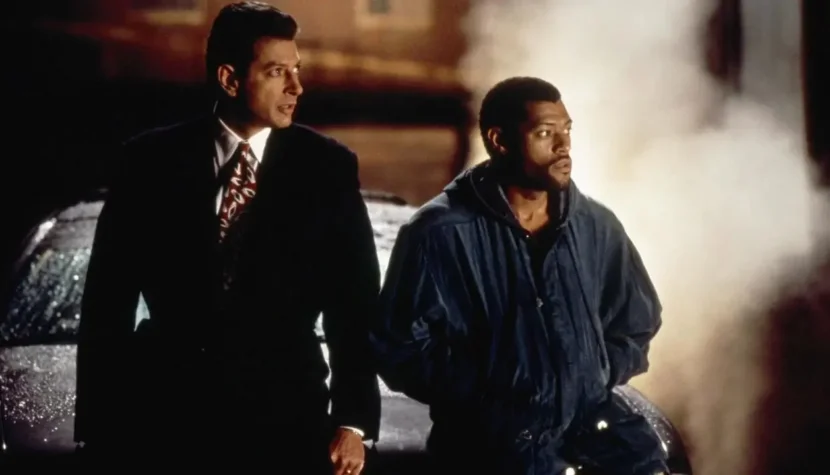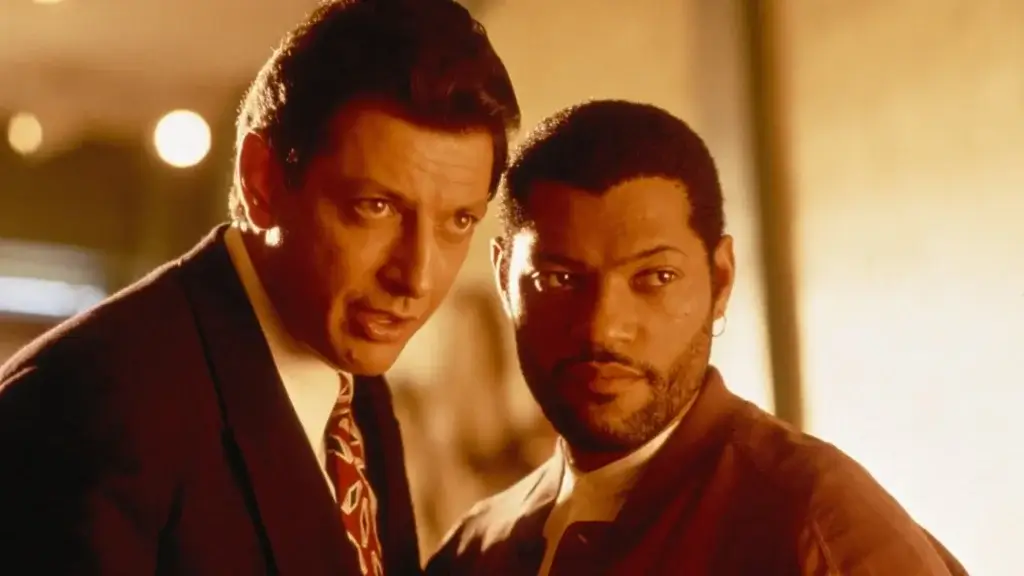DEEP COVER. A small yet grand thriller from the ’90s. They don’t make them like this anymore

The best undercover cop movie ever made. The best role Laurence Fishburne has ever delivered. One of the most intriguing gangster-police films of the ’90s. That’s a lot of “bests,” but this title is easy to overlook. Knowing nothing about it, I once sat down for a late-night screening. Within the first few minutes, I was hooked—and I still am. Ladies and gentlemen, here’s a small but great film – Deep Cover: a brilliant neo-noir, sharp action thriller, and Shakespearean drama with heavy rap beats and gritty streets as its backdrop.
Russell Stevens, the son of a drug addict and thief, is a cop and a teetotaler. He goes undercover as a dealer, tasked with taking down major players. His entry point into their world is David, a lawyer dreaming of getting rich off drugs.
The film was directed by Bill Duke, better known to audiences as “Mac, mowing down the jungle” in Predator. He doesn’t spin the tale like a grandpa by the fireplace; from the opening frames (rap, red filters, and the sharp burn of a crack pipe), we know we’re in for a ride. It’s the ’90s: smoke pours out of mouths and gun barrels, black briefcases conceal drugs, and the streets are not just fraught with danger but moral dilemmas. The dialogue crackles, the humor is biting and infectious, and every corpse drops with weight and seriousness.

Our lost cop narrates his journey through these treacherous paths in a rough, ironic style, revealing the heavy dilemmas and unwritten rules of the streets. With a low voice that reverberates in your skull, he delivers a tar-black poetry or rap-confession that could easily be released on vinyl. Step aside, Deckard; in the “voiceover” category, we have an equally dazzling star. Fishburne’s entire performance deserves a standing ovation. His cop truly fights—against gangsters and against his own newly awakened openness to life’s darker sides. Fishburne combines the stoicism of a boulder with the agility and alertness of a panther, ready to spring. The question is: in which direction, and at what cost?
His decisions surprise us, and the tension generated by his character is palpable. The cop’s struggles feel authentic, but the filmmakers avoid excessive existential brooding. After all, he’s from L.A., not Denmark; he has to act quickly, avoid blowing his cover, and rely on a sharp aim or a cutting one-liner to save himself. Yet the identity crisis—a common theme in undercover cop movies—plays out here not just dramatically but also with striking psychological credibility.
Jeff Goldblum also shines in Deep Cover. His laid-back (until he’s not) lawyer is an ambitious man. He craves power and wealth but isn’t drawn to killing. As a pragmatist, though, he decides to suppress any scruples. Both men trust only each other and undergo transformations that will push them onto entirely new paths. The actors deliver a brilliant spectacle of opposites attracting, creating a compelling and naturally charged portrayal of a friendship that, for Russell, isn’t just a facade.
The criminal underworld is equally well-portrayed. The gangsters are unpredictable, drugged up, and aggressive—sometimes funny, but more often terrifying because forgiveness is not an option in this world. The underworld serves up a few scenes that would probably make Tarantino a bit envious.

The music—pulsating gangsta rap tracks and ominous ambient murmurs—creates a moody and nerve-wracking backdrop for Deep Cover. The soundtrack features the crème de la crème of ’90s “black” sounds, led by Dr. Dre’s defiant track Undercover Cop. And no, you don’t have to like rap to feel how this music gets under your skin.
The city feels alive, heavy, and oppressive. The portrayal of the world convinces: violence erupts suddenly, people high on drugs are sweaty and “too much,” and after a shootout comes shock and exhaustion. There’s a wild panta rhei in play—alliances, motivations, and morals shift abruptly. The only constant is the lack of constancy, something our cop experiences painfully. The filmmakers stay close to the streets without over-stylizing. Yet many frames (like Russell walking in the rain after a shootout in a restroom) are small noir masterpieces; Michael Mann would likely nod in approval. But beyond aesthetic smoke and mirrors (steam wafting in alleyways, oppressive interiors), the film generates real mental pressure. We don’t know who Russell is or where he’s headed. Instead, we’re given a cinematic treatise on the human character, which can flip entirely, shaking the whole construct (read: person) to create something new—a theme similarly explored in the series Breaking Bad.
The ’90s loved undercover cop movies. Point Break, Rush, and Stone Cold tackled this theme. But for me, Deep Cover is the pinnacle. It delivers the most tension, the truest depiction of the streets, and an inimitably dense, gritty atmosphere of the decade. The filmmakers have so tightly and skillfully compressed all the elements that I feel like I’ve watched several great films—each working on different levels—rolled into one stylish, intelligent thriller. Even the slightly weaker ending—more naive than the rest of the film—doesn’t diminish the power of this gem. Ladies and gentlemen, they don’t make them like this anymore.

